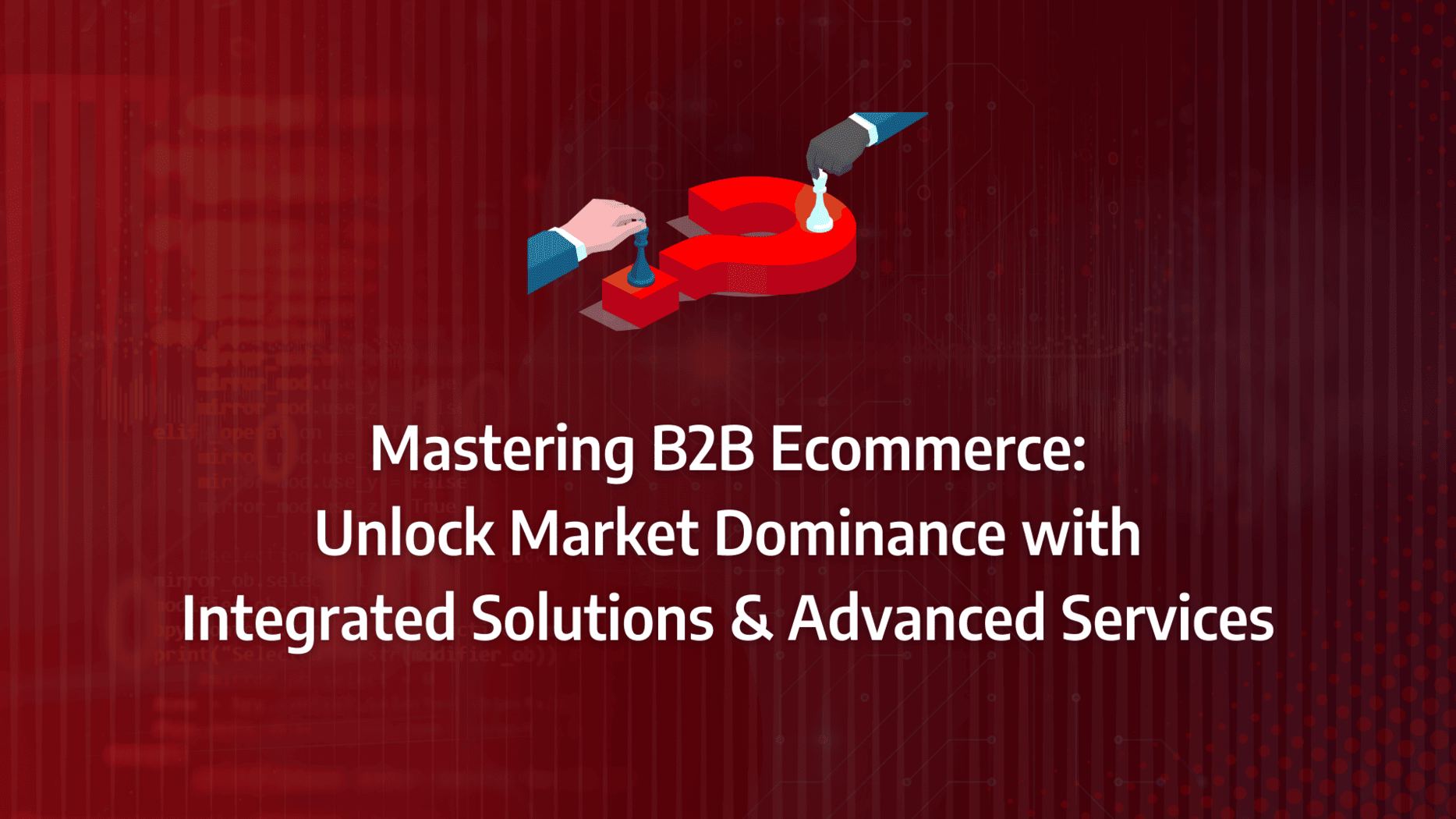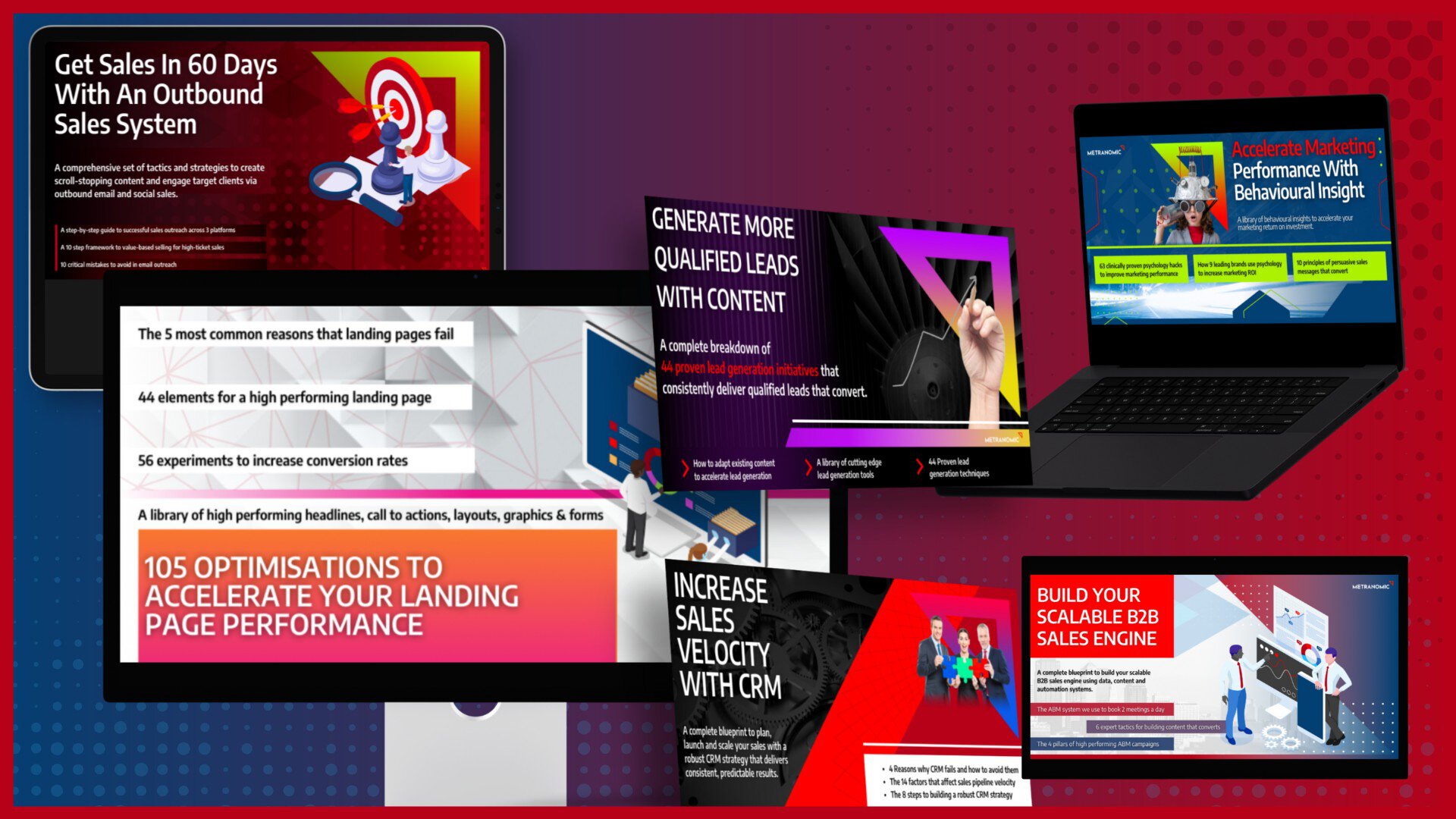When navigating B2B ecommerce, you likely face the challenge of integrating complex systems, managing customer expectations, and maintaining a seamless operation—all while trying to outpace your competitors. It’s a daunting task, but there’s a solution.
By embracing integrated B2B ecommerce solutions and advanced services, you can streamline your processes, enhance customer experiences, and ultimately, unlock market dominance. This guide will walk you through the strategies and tools you need to master B2B ecommerce, ensuring your business not only survives but thrives in today’s digital marketplace.
- Implement integrated B2B ecommerce solutions to streamline operations and create a seamless customer experience across all touchpoints.
- Leverage advanced services, such as AI-driven analytics and automated marketing tools, to enhance your ecommerce strategies and drive long-term growth.
- Overcome common integration challenges by choosing the right platform and ensuring compatibility with existing systems like CRM and ERP.
- Focus on personalising customer interactions to build stronger relationships and increase customer loyalty.
- Stay ahead of the competition by continuously optimising your ecommerce strategy and investing in the latest technologies.
What is B2B Ecommerce?
Business-to-business (B2B) e-commerce refers to the sale of products or services between two businesses, typically through digital platforms. Unlike B2C (business-to-consumer) models, where companies sell directly to individual customers, B2B ecommerce focuses on transactions between wholesalers, manufacturers, and retailers. In essence, it’s a streamlined way for businesses to trade goods and services through online portals, which facilitates everything from order management to inventory control.
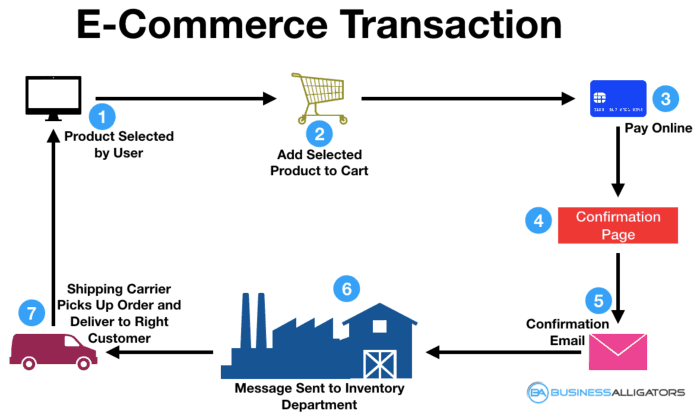
The global B2B ecommerce market is expanding rapidly, with some estimates valuing it at over $12 trillion, accounting for 13% of all B2B sales in the United States alone. The reason for this growth? Technological advancements in B2B ecommerce platforms, which have revolutionised traditional sales methods that once relied on manual, labour-intensive processes. Today, through integrated B2B ecommerce solutions, businesses can significantly reduce operational costs and boost efficiency by automating processes that once required human oversight.
The Role of Automation in B2B Ecommerce
Traditionally, B2B transactions involved cumbersome procedures—manual processing, phone orders, and in-person meetings. However, the adoption of B2B e-commerce implementation has allowed sellers to automate various processes, making it easier to manage relationships with key stakeholders such as:
- Wholesalers
- Large-scale retailers
- Non-profit organisations and educational institutions
- Resellers
Through digital platforms, buyers and sellers can now interact and complete transactions at any time, from anywhere. This flexibility, supported by mobile-friendly technology, has opened up new channels for businesses to connect with suppliers and distributors seamlessly.
Automation, in particular, has transformed the wholesale industry. It ensures businesses never miss out on orders placed outside of standard working hours. As Paul Hodge, CEO of Laird Superfood, notes, “Automating the wholesale process stops us from missing 2 a.m. orders and prevents our customers from waiting until office hours to place their orders. It solves countless challenges.”
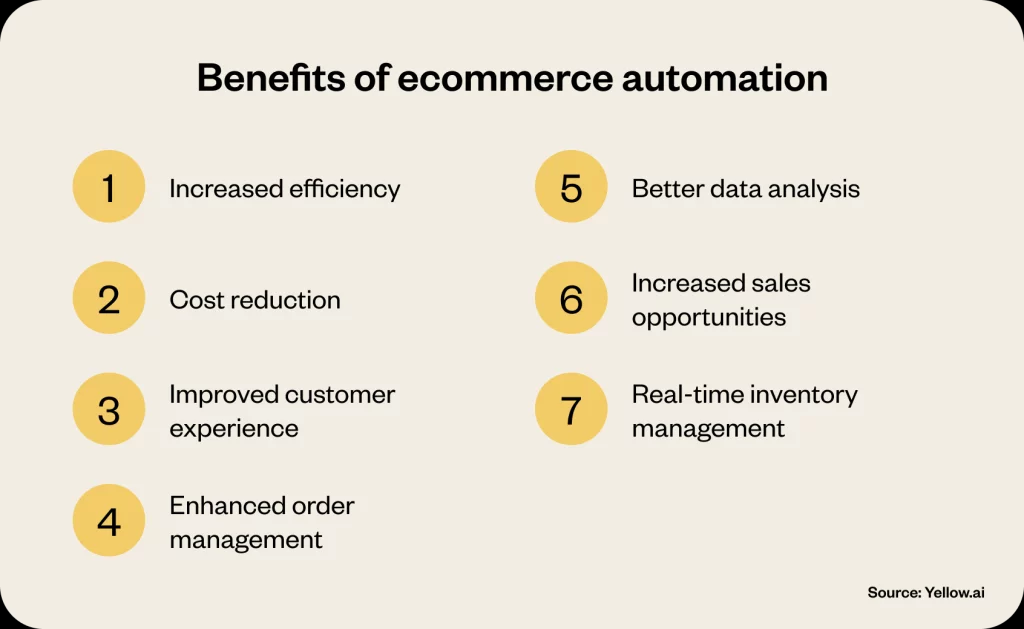
Key Advantages of B2B Ecommerce
The benefits of B2B ecommerce software extend far beyond automation. Key advantages include:
- Automated sales processes: Reducing the need for manual intervention between businesses, suppliers, and distributors.
- Lower overheads: Minimising infrastructure costs by eliminating the need for intermediaries.
- Scalability: The ability to reach a global market at scale, increasing revenue potential.
- 24/7 omnichannel presence: Offering a seamless experience across multiple channels, available around the clock.
- Improved business relationships: Strengthening partnerships by providing a smoother transactional process.
- Increased productivity: Automating time-consuming tasks frees up employees to focus on strategic activities.
What Matters Most?
Successful B2B ecommerce hinges not only on technology but on the seamless alignment with customer experience. Clients often discover that the more their digital platforms reflect the complexity of B2B buying processes—like multi-decision-maker workflows and unique pricing—the more they resonate with customers. Another strategic insight we’ve seen is the critical importance of personalisation at scale. Companies that tailor their ecommerce experiences to individual buyer behaviours typically see much stronger customer loyalty.Get In Touch
Types of B2B Ecommerce
When starting out with B2B ecommerce, businesses generally fall into one of three main categories, though many operate across multiple categories simultaneously. Each has its distinct advantages and challenges, and the choice depends on the company’s goals and resources.
B2B2C (Business-to-Business-to-Consumer)
In the B2B2C model, businesses sell goods directly to consumers but without relying on a middleman. Typically, wholesalers or manufacturers produce the products, which are then sold to B2B entities that, in turn, market them directly to the end consumer. This model allows the original manufacturer or wholesaler to maintain a closer relationship with the consumer while benefiting from the B2B transaction layer.
In the integrated B2B ecommerce landscape, B2B2C businesses often operate a digital storefront that showcases their entire product catalogue. In many cases, consumers are unaware that the products they’re purchasing aren’t directly manufactured by the storefront they are interacting with. The seamless transition between B2B and B2C highlights the power of ecommerce in driving efficiency and customer engagement.
Wholesale
Wholesale, one of the more traditional B2B ecommerce models, involves businesses purchasing products in bulk from distributors or manufacturers to sell them at retail prices to consumers. In a B2B ecommerce strategy, wholesalers can gain considerable traction by leveraging buyer-oriented marketplaces. These platforms present an opportunity for wholesalers to advertise their products to interested retailers and buyers with minimal marketing effort.
Buyer-oriented B2B ecommerce software supports marketplaces where many buyers are on the lookout for competitive suppliers. These platforms allow buyers to invite manufacturers to showcase their products, often engaging in a bidding process to secure the best deal. As wholesale continues to evolve digitally, the ability to tap into large buyer bases through ecommerce platforms enhances efficiency and reach.
Source: McKinsey
Manufacturer
Manufacturers typically produce goods in bulk, which are then sold to other businesses such as suppliers, wholesalers, or other manufacturers. Take, for example, a manufacturer of specialised shoelaces. These might be sold to a high-end shoe manufacturer, who then assembles the final product and adds their branding before distributing it to wholesalers.
In the current B2B ecommerce implementation climate, manufacturers are increasingly expected to meet digital demand. Buyers and suppliers alike seek more flexibility in how they purchase goods, often requiring online purchasing options that include personalised features like tailored pricing, custom production schedules, or specific sizing options. Manufacturers that invest in integrated B2B ecommerce capabilities will be better positioned to meet these demands, streamlining their operations and improving the customer experience.
Distributor
Distributors serve as an intermediary, managing packaging, shipping, and marketing efforts that a manufacturer may not want to handle in-house. Partnering with distributors allows manufacturers to offload these critical tasks, freeing up internal resources.
Online platforms now enable manufacturers and distributors to forge partnerships more easily. By negotiating and managing deals through B2B ecommerce software, they can optimise the supply chain, delivering faster and more efficiently to meet customer expectations.
What are some key features to look for in a B2B ecommerce platform?
Selecting the right B2B ecommerce platform is a crucial step for any business looking to scale. The key to success lies in understanding your specific needs and aligning those with the platform’s capabilities. There’s no one-size-fits-all solution, so careful consideration is required when determining which features will drive your business forward. Before delving into the specific features of the leading platforms, it’s essential to ask three critical questions:
- Am I prepared for disruption?
- What are my business objectives?
- How much investment am I willing to commit?
These questions are vital, as the competitive landscape is constantly evolving. Rapid innovation by competitors is a significant risk, and businesses must ensure they are equipped with integrated B2B ecommerce solutions that facilitate growth and innovation.
Key Features of an Effective B2B Ecommerce Platform
Here are the critical features to look for in B2B ecommerce software that will enable your business to scale, innovate, and compete effectively.
Feature 1: Modularity
A platform with modular architecture allows for flexibility and growth, making it easier to expand into new regions and customise functionality as needed. Modularity enables businesses to deploy standalone elements independently, offering greater agility. By opting for a modular framework, such as Virto Atomic Architecture™, companies can avoid the limitations imposed by monolithic systems, which can restrict flexibility and innovation.
Feature 2: Headless Architecture
A B2B ecommerce platform with headless architecture separates the frontend from the backend, facilitating seamless integration across various channels. This flexibility is crucial for supporting omnichannel strategies that cater to diverse audiences. Communication between the frontend and backend is handled through APIs, which ensures that the platform can integrate quickly into any business configuration without risk, thus supporting your B2B e-commerce implementation needs.
Feature 3: Integrations and Third-Party Support
The best B2B ecommerce platforms must offer robust integration capabilities. A solid API-first approach ensures that your chosen platform can integrate with other solutions, such as ERPs, CRMs, and marketing automation systems. This level of third-party support guarantees seamless data transfer between platforms, which is critical for businesses managing multiple systems.
Feature 4: Customisation for Enterprise Scenarios
Enterprises often require bespoke solutions to meet their unique operational demands. An effective B2B ecommerce strategy will include platforms that allow for deep customisation without sacrificing upgradability. With customisation options, businesses can tailor their ecommerce platform to support complex workflows, diverse product catalogues, and unique pricing structures, all while maintaining a seamless user experience.
Feature 5: Extensibility Framework
An extensibility framework is essential for long-term innovation. Platforms that offer powerful extensibility provide development teams with the tools needed to introduce new functionalities or enhance existing ones. A robust extensibility framework ensures that the platform remains upgradeable, allowing your business to continuously evolve without the need for expensive or disruptive overhauls.
Feature 6: Localisation and Multi-Regional Support
Global businesses require platforms that can support localisation. This means handling multiple currencies, payment methods, and language options. A comprehensive B2B ecommerce platform should allow for seamless multi-regional support, ensuring that product descriptions, catalogues, and pricing structures are tailored for local markets. This capability is essential for businesses looking to expand their reach beyond domestic borders.
Feature 7: Cloud-Native Architecture
Cloud-native platforms offer numerous benefits, particularly in terms of scalability and security. A B2B ecommerce software solution that is built for the cloud from the ground up can handle the complexities of multi-regional implementation, provide enhanced data privacy, and support business growth. Cloud-native platforms also offer the agility required to respond quickly to changes in the market, making them a valuable asset in any B2B ecommerce strategy.
Feature 8: Open Source Flexibility
Open source platforms offer transparency and flexibility. Developers can access and modify the platform’s code, allowing for greater customisation and faster problem resolution. With open-source software, businesses can implement tailored solutions that align with their unique needs while benefiting from a collaborative development environment that promotes continuous improvement.
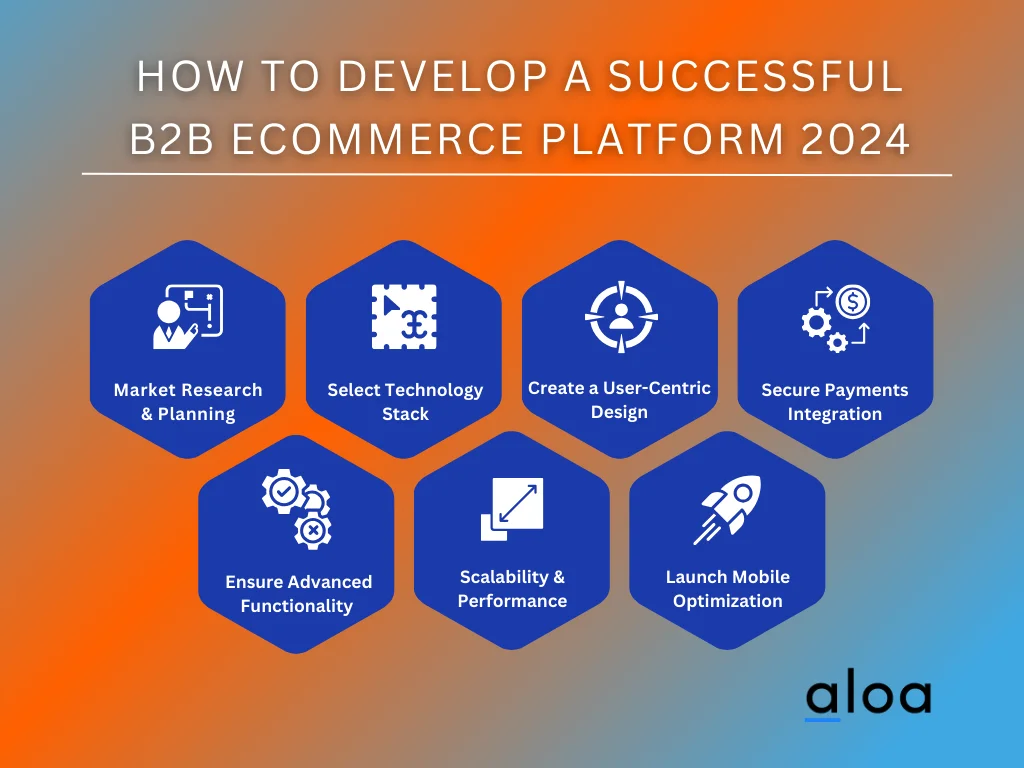
What are some popular platforms for B2B ecommerce?
Selecting the right B2B ecommerce platform can be a game-changer for businesses seeking to scale and streamline their operations. In 2024, several platforms stand out for their security, ease of use, innovation, and flexibility. Below, we explore the leading platforms and the features that make them ideal for B2B ecommerce implementation.
1. Shopware
Shopware is a robust B2B ecommerce platform known for its focus on security, innovation, and user-friendly interface. With open-source code, businesses can customise their ecommerce environment to suit their needs. Shopware’s drag-and-drop interface, digital sales rooms, roles management, and automated workflows simplify even the most complex sales processes. The platform also supports an API-first approach and customer-specific pricing, making it a versatile solution for businesses of all sizes.
Understanding the unique challenges faced by B2B ecommerce brands—such as complex sales processes, integrating third-party systems, and creating tailored catalogues—Shopware delivers features that address these needs efficiently. Its flexibility ensures businesses can scale without compromising on performance.
Source: Gartner
2. CS-Cart
CS-Cart provides businesses with a ready-to-use B2B ecommerce software solution, allowing them to launch their websites in a matter of days. Recognised in the Capterra Shortlist of Ecommerce Software in both 2021 and 2022, CS-Cart has a proven track record in helping over 50,000 firms globally expand their audience reach, grow their product range, and penetrate new markets.
3. Shift4Shop
Formerly known as 3dcart, Shift4Shop is an all-in-one B2B ecommerce platform designed for businesses and serious internet marketers. It offers a range of features, including marketing tools, customisable design templates, inventory management, and SEO integration. Shift4Shop enables businesses to create, manage, and expand their sites with ease, making it a great choice for companies looking to enhance their digital presence.
4. Shopify Plus
Since its launch in 2014, Shopify Plus has become a preferred B2B ecommerce platform for hyper-growth enterprises. It provides a tailored solution that is both quick and cost-effective, requiring minimal development time. Supporting millions of businesses, from startups to Fortune 500 companies, Shopify Plus offers the scalability required to manage substantial growth while ensuring efficiency and simplicity.
5. BigCommerce
BigCommerce is a partner-centric, multi-tenant SaaS platform that caters to wholesalers and manufacturers. It is a versatile B2B ecommerce solution, featuring headless architecture that helps businesses meet buyer demands with a tailored and intuitive interface. Known for its flexibility, BigCommerce enables firms to deliver a superior buyer experience, regardless of their industry. The platform has received numerous accolades, including a gold medal for total cost of ownership, making it a cost-effective choice for businesses seeking long-term growth.
Our Tactical Recommendations
From our experience, clients frequently gain significant traction by implementing real-time inventory management systems that sync seamlessly with their e-commerce platforms. This tends to build trust and ensures customers have the most accurate information. Another highly effective tactic involves shifting more traditional sales functions to self-service models; typically, this leads to increased revenue and greater customer satisfaction. Lastly, we’ve seen that adopting an API-first approach enables companies to integrate third-party tools and scale their e-commerce operations without heavy replatforming, a step that clients often find invaluable when scaling rapidly.Get In Touch
How can businesses ensure security when conducting B2B ecommerce transactions?
Securing your B2B ecommerce operations is critical to maintaining trust and protecting sensitive business and customer data. As cyber threats become more sophisticated, an integrated B2B ecommerce solution with comprehensive security measures is vital. This approach enables businesses to detect and respond to threats in real time, ensuring ongoing protection across all digital channels. Below are five essential strategies to enhance cybersecurity in your B2B ecommerce business.
1. Ensure Data Privacy Compliance
In today’s global market, data privacy regulations vary significantly across regions. Compliance with these laws is paramount for businesses engaged in B2B e-commerce implementation. From India’s Information Technology Act to the EU’s General Data Protection Regulation (GDPR), these frameworks dictate how businesses can collect, process, and share personal data. While adhering to multiple regulatory standards can be challenging, ensuring compliance is necessary to protect sensitive information.
Your B2B ecommerce software must incorporate security features that safeguard data at every stage of the customer journey. For instance, platforms like Salesforce offer built-in tools that manage privacy at each phase of the data lifecycle, ensuring transparency and control for customers. Implementing appropriate security measures, obtaining valid consent, and offering clear transparency will help your business remain compliant and secure.
2. Protect Sensitive Data During Testing and App Development
During the development, testing, or upgrading of ecommerce applications, data vulnerabilities can arise if adequate precautions are not taken. It’s easy to overlook potential security issues, which could expose sensitive customer or business data to risks.
One effective solution is data masking, a process that replaces sensitive B2B ecommerce data with dummy information. By substituting real data with random characters or numbers, or by masking specific sensitive fields, businesses can ensure that no actual data is exposed during testing phases. Additionally, Salesforce Shield’s AI-enabled cybersecurity tools can help identify and classify critical information quickly, allowing businesses to apply the correct protection controls sooner rather than later.
3. Regularly Purge Customer Records
An often overlooked but effective way to safeguard customer data is to routinely clear unused or redundant records from your B2B ecommerce platform. Data that no longer serves a business purpose is an easy target for cyber-attacks. By purging unnecessary information and securely storing essential data, businesses can minimise their risk.
Salesforce’s advanced archiving and retention tools make it easy to manage your data responsibly. These tools allow you to sift through relevant data, anonymise critical information, and transfer it to more secure storage areas. This approach not only strengthens security but also ensures that your data retention policies align with compliance requirements.
4. Enhance Mobile User Interface Security
With the growing use of mobile devices for ecommerce transactions, ensuring the security of mobile interfaces has never been more important. Mobile devices often lack robust anti-malware protection, making them susceptible to phishing attacks or unauthorised access to your B2B ecommerce site. Passwords alone are no longer sufficient to protect mobile users.
